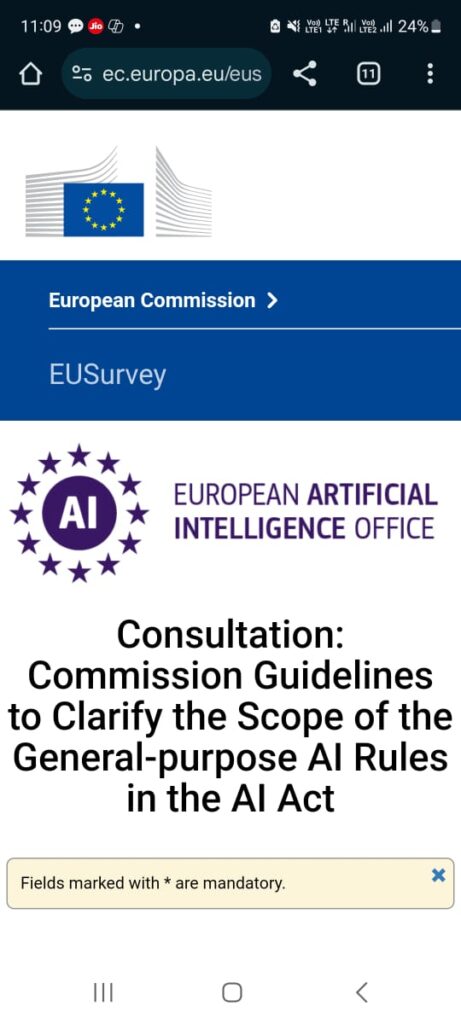On April 22, 2025, the European Commission has invited stakeholders across different domains to provide input on the regulation of general-purpose AI (GPAI) models i.e. over Third draft of Code of Practice on General Purpose AI Models under EU AI Act . The targeted consultation aims to draw on practical experience from the field to shape forthcoming Commission guidelines.
(You are invited to provide feedback on the consultation by 22 May.)
Practical Experience at the Core of New AI Rules
In a statement released today, the Commission stated: “Today, the Commission invites stakeholders to bring their practical experience to shape clear, accessible EU rules on general-purpose AI (GPAI) models in a targeted consultation that will contribute to the upcoming Commission guidelines.”
The initiative signals the Commission’s ongoing efforts to ensure the practical applicability of the AI Act, a key legislative framework that governs the development, marketing, and deployment of AI technologies within the European Union. Stakeholders now have the opportunity to inform these rules with real-world insights and scenarios.
Clarifying Core Concepts in the AI Act
The upcoming guidelines will play a crucial role in interpreting the new provisions in the AI Act related to GPAI. According to the Commission, the guidelines will aim to provide “detailed explanations on questions such as ‘what is a general-purpose AI model’, ‘which entities are providers in various constellations’, and ‘which actions constitute a placing on the market’.”
These clarifications are expected to address current ambiguities surrounding GPAI models and their regulatory status, especially in the wake of rapid advancements in AI capabilities and deployment.
Role of the AI Office and Support for Compliance
To support smooth implementation of the rules, the Commission emphasized the role of the newly established AI Office. According to the statement, the guidelines “will also lay out how the AI Office will provide support to facilitate compliance.”
The AI Office is envisioned as a central supervisory body to monitor, support, and enforce provisions under the AI Act, working closely with the AI Board and national authorities.
Code of Practice and Reduced Burden for Providers
In a move likely to incentivize early and voluntary compliance, the Commission revealed that signing the Code of Practice could help streamline regulatory obligations for GPAI providers. The statement added that the upcoming guidelines “will explain how signing the Code of Practice – if approved by the AI Office and the AI Board – may reduce administrative burden for providers and serve as a benchmark for regulatory compliance.”
This step is designed to foster greater transparency and proactive alignment with EU values among AI developers and distributors.
Complementary to the Code of Practice
The guidelines are set to serve as a companion to the much-anticipated Code of Practice on General-Purpose AI, which is currently under finalization. The Commission clarified: “In this respect the guidelines will complement the Code of Practice on General-Purpose AI, which is currently being finalised.”
While the Code of Practice will lay down best practices for GPAI model development and use, the guidelines will provide interpretive direction on how to meet regulatory expectations.
Inclusive Call for Feedback
The Commission is calling on a broad spectrum of participants to contribute to the consultation process. The call explicitly invites “providers of GPAI models, downstream providers of AI systems, civil society, academia, other experts, and public authorities” to submit their perspectives.
Feedback must be submitted by 22 May 2025, giving stakeholders one month to provide their views and practical suggestions.
Non-Binding But Influential Guidelines
While the guidelines will not carry the force of law, they are expected to significantly influence how the AI Act is implemented and enforced across the EU. The Commission noted: “The guidelines will not be binding but provide clarification on how the Commission, responsible for supervising and enforcing the general-purpose AI rules, will interpret and apply them under the AI Act.”
Such guidance will be essential for industry players seeking to avoid regulatory pitfalls and align their operations with the spirit and letter of the law.
Publication Timeline Confirmed
Both the guidelines and the finalized Code of Practice are slated for release ahead of August 2025. Their publication will mark a crucial phase in the full-scale application of the AI Act, particularly as general-purpose AI technologies gain momentum across public and private sectors.
Further Consultations in the Pipeline
The Commission also hinted at future regulatory initiatives, stating: “As part of its efforts to support stakeholders in implementing the AI Act, the Commission will also soon launch a targeted consultation on the classification of AI systems as high-risk.”
This upcoming consultation will delve into another vital area of the AI Act – the identification and handling of high-risk AI systems, which are subject to stricter obligations under the regulation.
What’s Next for Stakeholders
With the consultation window now open, industry leaders, researchers, and public bodies are encouraged to act swiftly. Participation in this consultation represents a rare opportunity to influence the trajectory of one of the world’s most comprehensive AI regulatory frameworks before it takes full effect.
REFERENCES
- https://digital-strategy.ec.europa.eu/en/news/commission-seeks-input-clarify-rules-general-purpose-ai-models
- https://ieu-monitoring.com/editorial/general-purpose-ai-models-eu-commission-seeks-input-to-clarify-rules/611747?utm_source=ieu-portal
- https://www.lexisnexis.co.uk/legal/news/commission-launches-consultation-on-general-purpose-ai-guidelines

